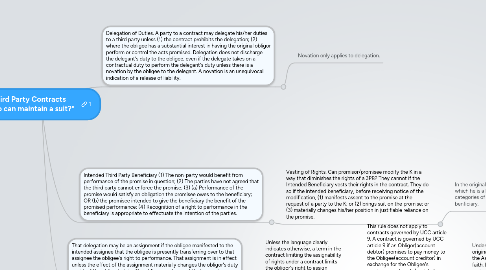
1. Delegation of Duties. A party to a contract may delegate his/her duties to a third party unless (1) the contract prohibits the delegation; (2) where the obligee has a substantial interest in having the original obligor perform or control the acts promised. Delegation does not discharge the delegant's duty to the obligee, even if the delegate takes on a contractual duty to perform the delegant's duty unless there is a novation by the obligee to the delegant. A novation is an unequivocal indication of a release of liability.
1.1. Novation only applies to delegation.
2. Intended Third Party Beneficiary (1) The non-party would benefit from performance of the promise in question; (2) The parties have not agreed that the third party cannot enforce the promise; (3) (a) Performance of the promise would satisfy an obligation the promisee owes to the beneficiary; OR (b) the promisee intended to give the beneficiary the benefit of the promised performance; (4) Recognition of a right to performance in the beneficiary is appropriate to effectuate the intention of the parties.
2.1. Vesting of Rights. Can promisor/promisee modify the K in a way that diminishes the rights of a 3PB? They cannot if the Intended Beneficiary vests their rights in the contract. They do so if the intended beneficiary, before receiving notice of the modification, (1) manifests assent to the promise at the request of a party to the K; or (2) brings suit on the promise; or (3) materially changes his/her position in justifiable reliance on the promise.
2.1.1. In the original R, a donee beneficiary's rights vest immediately upon formation of the K of which he is a beneficiary. An incidental 3PB cannot enforce the promise, but the two categories of intended beneficiaries who can are creditor beneficiaries and the donee benficiary.
3. That delegation may be an assignment if the obligee manifested to the intended assignee that the obligee is presently transferring over to that assignee the obligee's right to performance. That assignment is in effect unless the effect of the assignment materially changes the obligor's duty or risk of the obligor's duty. The obligor must accept that person's performance in fulfillment of the obligee's duty unless the undertaken duty is non-delegable.
3.1. Unless the language clearly indicates otherwise, a term in the contract limiting the assignability of rights under a contract limits the obligor's right to assign his/her performance, but does not limit the power of the obligor to assign his/her performance.
3.1.1. This rule does not apply to contracts governed by UCC article 9. A contract is governed by UCC article 9 if an Obligor(account debtor) promises to pay money to the Obligee(account creditor) in exchange for the Obligee's services, goods, sale/rental of property, or CC transactions. The Obligee then assigns the right to payment to the Assignee in exchange for money as loan or payment.
3.1.1.1. Under UCC Article 9, after the rights are assigned, the original contract parties can modify the contract without the Assignee's assent if the modification is made in good faith. But, the contracting parties cannot reduce the assigned payment right if it is fully earned by Assignor's performance and Obligor has received notice of the assignment.
3.1.1.1.1. If the Assignee makes a claim against the Obligor (account debtor), generally Obligor has the same defenses in response to the Assignee's claim that the Obligor would have been able to raise against the original Obligee had there been no assignment. An exception is where there is an off-setting claim that takes place after notice of the assignment. (Recoupment)
